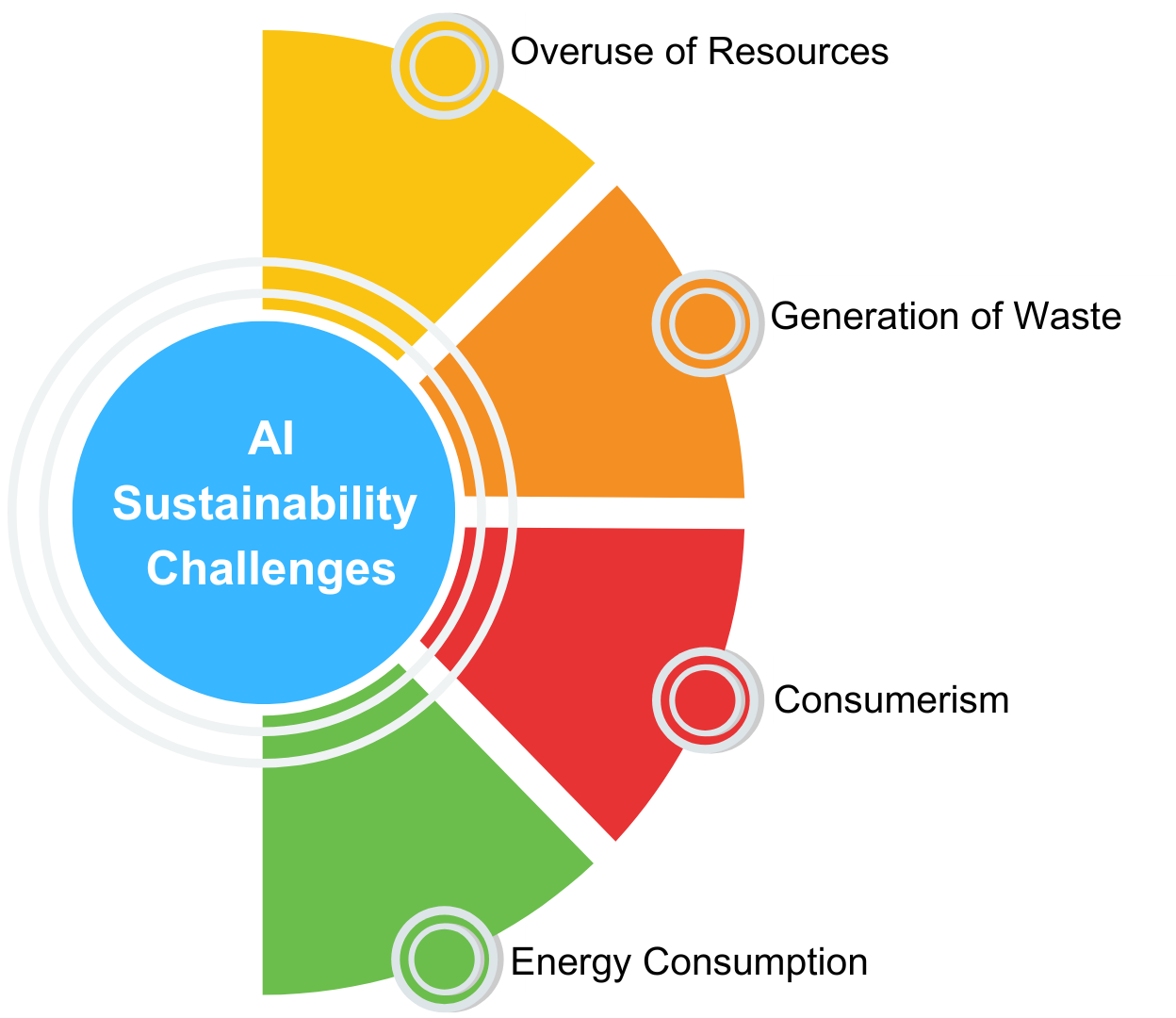AI-Powered Solutions for Sustainable E-commerce: Addressing the Environmental Challenges and Opportunities
E-commerce has become a pivotal component of the global economy, offering unparalleled convenience and accessibility to consumers worldwide. It’s rapid expansion has lead to significant sustainability challenges, including waste generation, excessive resource usage, higher energy consumption, and the encouragement of consumerism. Artificial intelligence (AI) has the potential to revolutionize the e-commerce industry by enabling more sustainable practices and overcoming these challenges. Significant insights on the EU’s e-commerce scene may be gained from data from Eurostat. For example, EU economic greenhouse gas emissions in the second quarter of 2023 were 821 million tonnes of CO2-equivalents (CO2-eq), down 5.3% from the same quarter in 2022 (867 million tonnes of CO2-eq). During the same era, the gross domestic product (GDP) of the European Union (EU) showed just a little shift, increasing by 0.05% in the second quarter of 2023 when compared to the same quarter in 2022.

AI can be utilized by businesses to improve product packaging efficiency, adopt energy-efficient technology, expedite supply chain processes, and maximize resource allocation. Minimizing waste and conserving resources not only improve operational effectiveness but also promotes sustainability. Like, by controlling and minimizing energy use in real-time, AI may greatly increase energy efficiency and reduce the carbon footprint of e-commerce operations.
Furthermore, AI can encourage sustainable purchasing habits by enabling users to track and lower their carbon emissions. AI-driven tools can provide personalized recommendations for eco-friendly products, track individual carbon footprints, and suggest ways to reduce environmental impact. Additionally, AI can facilitate circular economy initiatives by promoting the reuse and recycling of resources, helping to minimize waste and extend the lifecycle of products.

Prime Sustainability Challenges in E-commerce
Overuse of Resources: Resources are used extensively in the e-commerce industry for the manufacturing, packing, and delivery of items. Significant resource depletion and environmental damage are caused by this reliance on vast supply systems. The need for raw materials to produce goods and packaging keeps growing, which puts more pressure on natural resources.
Generation of Waste: Online shopping convenience has increased packaging waste, with cardboard boxes and single-use plastics frequently ending up in landfills. High return rates in e-commerce also lead to additional waste since a large number of returned products are disposed of rather than resold.
Energy Consumption: E-commerce activities use a lot of energy, especially in data center, warehousing, and shipping. The requirement for large-scale data processing in AI-driven operations drives up energy usage in data center, which raises carbon emissions, and the need for quick delivery services drives up fuel use.
Consumerism: Through flash sales, discounts, and targeted advertising, e-commerce platforms frequently encourage excessive consumption by pushing users to buy more than they actually need. This conduct intensifies the negative effects that waste and overproduction have on the environment.

AI as an Enabler for Sustainable Development in E-commerce
Based on the ideas presented in Tim Jackson’s book “Post Growth: Life after Capitalism” the goal should be to establish a sustainable economy that puts people’s welfare ahead of further expansion. AI can help with this transition by making e-commerce operations more sustainable and efficient.
Supply Chain Optimization: AI can increase the effectiveness of the supply chain by utilizing machine learning and predictive analytics. By enhancing demand forecasting, these technologies help reduce overproduction and facilitate improved inventory management. By determining the most effective delivery routes, AI-enabled logistics can also lower fuel consumption and carbon emissions. Such advancements align with Jackson’s vision of reducing resource intensity and ecological impact.
Improving Energy Efficiency: AI can improve data centers’ and warehouses’ energy usage. Energy waste may be greatly reduced by using smart grid technology and automated energy management systems to dynamically change lighting, heating, and cooling depending on real-time demands (Hassanien, Bhatnagar, & Darwish, 2020). Jackson’s emphasis on energy efficiency and the decoupling of economic activity from energy usage is in line with this strategy.
Encouraging Ecological Consumption: Recommendation engines powered by artificial intelligence (AI) have the potential to influence customer behavior by showcasing environmentally friendly items and offering comprehensive details about their effects on the environment. This may sway consumers’ preferences to choose environmentally friendly products (Dauvergne, 2020). AI can assist in societal change toward sustainability by encouraging mindful consumption.
Encouraging Initiatives for the Circular Economy: AI can help circular economy models by monitoring and controlling the lifecycles of products. This involves figuring out which things may be recycled, refurbished, or used again in order to cut waste and increase resource efficiency (Geels & Turnheim, 2022). Geels and Turnheim emphasize the significance of systemic shifts toward sustainability, and AI has the potential to be a key enabler of these shifts in the e-commerce industry.
Tracing and Reducing Individual Carbon Emissions: AI can enable people by monitoring the carbon emissions linked to their online transactions. AI systems can provide comprehensive reports on each product’s carbon footprint by evaluating purchase data, giving customers information about how each product affects the environment. These studies can recommend environmentally friendly items, provide suggestions for sustainable alternatives, and provide advice on how to save emissions—for example, by picking products with little packaging or deciding on consolidated transportation.
Carbon Credits and Individual Sustainable Solutions: AI can help e-commerce platforms integrate carbon credits so that customers may buy credits to offset their emissions and support environmental projects. AI may also suggest customized sustainable solutions, including using recyclable items, cutting back on energy use, or taking part in recycling initiatives. Artificial intelligence (AI) can assist people in actively lowering their carbon footprint by measuring progress and offering customized suggestions.
Potential Risks of AI in E-commerce Sustainability
Privacy Concerns: Large-scale data gathering and analysis are required when using AI for supply chain management and tailored suggestions. This presents serious privacy risks since it might lead to the improper handling or exploitation of private customer data. Mitigation: To secure customer information, put in place strong data protection procedures and clear data usage guidelines. It is crucial to abide with data protection laws like the GDPR.
AI Bias: AI systems have the potential to reinforce preexisting biases in supply chain management and customer behavior, which might result in uneven resource allocation and imbalances in the market. These prejudices have the potential to worsen social injustices by leading to discriminatory actions. Mitigation: Create and put into practice moral AI standards to guarantee responsibility, transparency, and justice in AI applications. Audit AI systems often to find and fix biases.
Energy Consumption: AI systems need a lot of energy, especially in data centers. Some of the benefits of sustainability may be offset by high energy consumption resulting from the processing power needed for AI activities. Mitigation: For data center, make investments in renewable energy sources and energy-efficient AI systems. Sustainability may be improved by using strategies like AI-powered energy management and energy-aware computing.
Consumer Manipulation: AI-powered marketing techniques have the power to trick customers into buying things they don’t need, which encourages overconsumption. This undercuts initiatives to promote environmentally friendly consumption habits. Mitigation: AI-driven marketing ought to put more of an emphasis on encouraging responsible consumption than on pushing for extravagant purchases. Providing clear information about a product’s environmental effect might encourage consumers to make sustainable purchase choices.
Case Study:
Spindle our AI enabled platform revolutionize carbon emission tracking in the e-commerce sector. Our platform enables businesses to eliminate paper receipts, optimize supply chain efficiency, and gain AI-driven insights into consumer preferences for sustainable products. For individuals, AI facilitates easy monitoring of carbon footprints from online purchases, promoting environmental awareness and accountability. The app supports monthly budgeting aligned with sustainable choices and offers personalized recommendations to encourage eco-friendly consumption habits. Users can earn carbon credits by auditing and adopting sustainable solutions such as solar panels and electric vehicles, which can be used for emissions offsetting or traded within the platform. Industries benefit from purchasing carbon offsets through platform, utilizing accumulated credits to mitigate environmental impact and support sustainability initiatives. Our platform exemplifies the transformative potential of AI in fostering a sustainable future where technology empowers responsible consumption and environmental stewardship.
Spindle offer automated carbon footprint management powered by AI and a carbon credit marketplace. We have developed cutting-edge AI algorithms to give organizations and people with automated, very precise carbon footprint tracking with minimal manual computations.
Integrated Carbon Credit Marketplace: Enables users to engage in the carbon economy and receive incentives by facilitating the easy purchase, sale, and exchange of carbon credits. Dual advantages: Promotes a comprehensive approach to sustainability by providing real advantages for both individuals and enterprises (by offsetting carbon emissions) and earning and spending credits on sustainable goods.
Conclusion:
AI holds substantial promise in advancing sustainability within the e-commerce sector through optimizing supply chains, improving energy efficiency, fostering sustainable consumption habits, promoting circular economy practices, and empowering individuals to monitor and reduce their carbon footprints.
Nevertheless, it is imperative to address associated risks such as privacy concerns, algorithmic bias, energy consumption, and potential consumer manipulation. Implementing rigorous data protection protocols, adhering to ethical guidelines for AI deployment, adopting energy-efficient technologies, and advocating responsible consumption practices are pivotal steps toward harnessing AI’s potential for driving substantial shifts towards a more sustainable future in e-commerce.
Author :Vishvjeet Singh